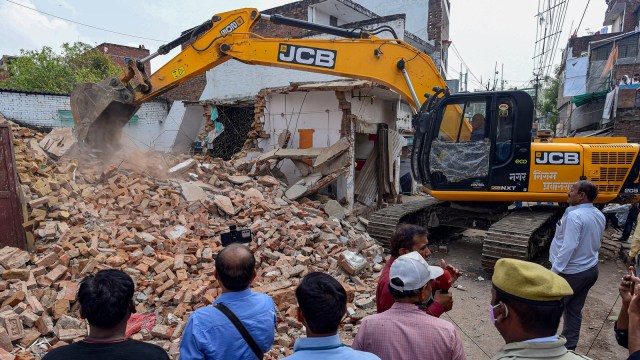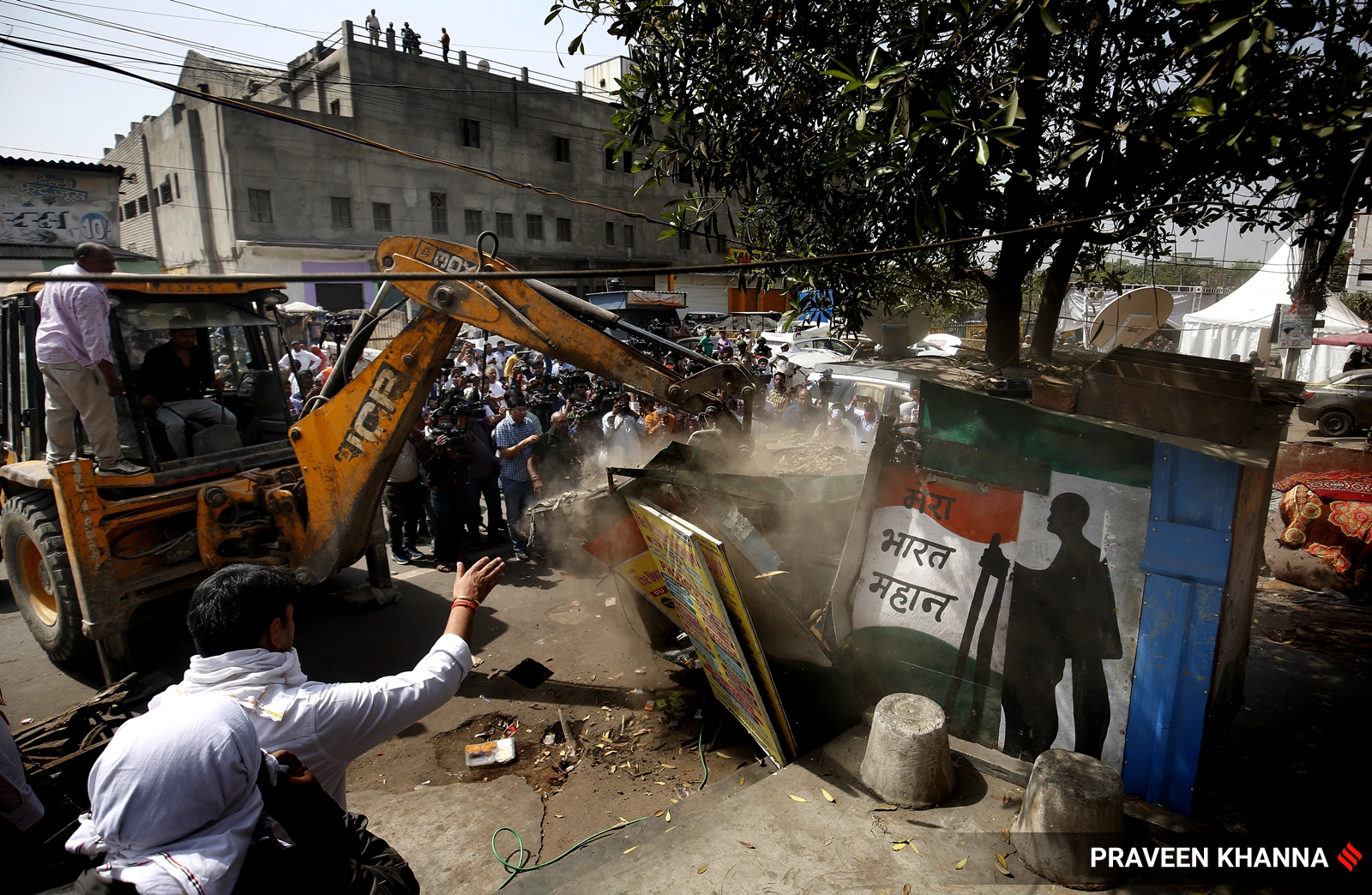Delhi to Ratlam: Flicker of hope for lives razed as SC questions bulldozer justice
The first of these pleas was filed by the Jamiat-Ulama-i-Hind on April 20, 2022, in the midst of a demolition drive following communal violence in Delhi’s Jahangirpuri.
 Supreme Court on Monday said it would lay down “pan-India” guidelines on demolition of houses linked to people accused of crimes.
Supreme Court on Monday said it would lay down “pan-India” guidelines on demolition of houses linked to people accused of crimes.From a juice shop owner in Delhi to a tempo driver in Rajasthan to a loader in Madhya Pradesh — it was the demolition of several properties that came up before the Supreme Court, which on Monday said it would lay down “pan-India” guidelines on demolition of houses linked to people accused of crimes.
The first of these pleas was filed by the Jamiat-Ulama-i-Hind on April 20, 2022, in the midst of a demolition drive following communal violence in Delhi’s Jahangirpuri.
While the violence was witnessed on April 16, state BJP president wrote a letter to the North Delhi Municipal Corporation three days later, seeking demolition of properties of alleged rioters. The next day, the NDMC launched a demolition drive to remove “illegal encroachments”.
On April 24, another petition was filed by former Rajya Sabha MP and CPI(M) leader Brinda Karat challenging the demolition drive.
 Demolition drive at Jahangirpuri in New Delhi on April 20, 2022 (Express Photo by Praveen Khanna)
Demolition drive at Jahangirpuri in New Delhi on April 20, 2022 (Express Photo by Praveen Khanna)
One of the structures partially demolished in the drive was Ganesh Gupta’s juice shop, located at a junction next to Kushal Cinema in Jahangirpuri.
“It has taken a lot of hard work to get this shop up and running again,” 56-year-old Gupta told The Indian Express.
On the day of the demolitions, the Supreme Court had stayed the demolition drive, but the NDMC went ahead with it, Gupta said. “They told us that until they received a hard copy of the order, they wouldn’t stop,” he said.
Gupta recalled hearing about the impending demolitions on the news and running to his shop with the building’s documents. “I kept shouting that I have all the papers, but no one listened,” he said. He also claimed that he had not received any notice from the NDMC.
The shop had been allotted by Delhi Development Authority to Gupta’s father in 1977. He now runs it with his son, Rajan (32).
After the demolition, the shop remained closed for six months as Gupta tried to arrange the money to rebuild it. “I took a loan and borrowed money from relatives… The biggest problem was that my daughter was to get married in November. We had to borrow money from her in-laws, too. In total, I would have borrowed at least Rs 12-15 lakh. I’ll have to repay this debt for the rest of my life,” said Gupta.
He said he suffered a heart attack days after the demolition, and another one six months later, just before his shop reopened.
Gupta welcomed the Supreme Court’s observation on Monday. “Even if I was involved in the riots, how could they demolish my shop until I’m proven guilty? I pay tax, MCD’s licence fee, DDA’s lease… How could they come here and say my shop was unauthorised?” he asked.
‘Nobody listened’
Also among petitioners who approached the Supreme Court against “bulldozer justice” is a labourer from Madhya Pradesh’s Ratlam district, whose home was partially demolished after his son was arrested for allegedly slaughtering a cow and dumping its carcass at a temple in June this year.
“Our family built the home in 50 years, and the bulldozers demolished it in four hours. We welcome the Supreme Court observations and hope they protect the common citizens of this country. I paid taxes and electricity bills. I had court orders in my favour regarding the house, but nobody listened to us,” 54-year-old Hussain told The Indian Express.
Hussain works as a loader, earning around Rs 5,000-7,000 per month. His family comprises seven members.
The property that was demolished was located at Jaora in Ratlam, and comprised a house and a shop. Hussain’s grandfather Noor Mohammad had purchased the property in 1990 and eventually divided it amongst his five sons, he said.
 In another district of Madhya Pradesh — Mandla, houses “where beef was found” were demolished on June 15 (Express Photo)
In another district of Madhya Pradesh — Mandla, houses “where beef was found” were demolished on June 15 (Express Photo)
The incident that eventually led to the demolition took place on June 13-14, and prompted several outfits to orchestrate a shutdown of Jaora and blockade a four-lane road.
Police initially arrested two persons – Sharukh and Noshad Qureshi – in the case, and imposed provisions of the National Security Act on them.
Later, a police team reached Hussain’s house asking about his son, Salman Mevati. The son was asked to go to the police station and eventually arrested.
Hussain said a large crowd had gathered outside the police station demanding that his house be demolished. He recalled that he had grabbed all the relevant documents “to show ownership”, but “the authorities paid no heed”, and demolished around 10 feet of the property.
His family then had to move out. “Our family could not get any home on rent as we were ostracised. My sons were fired from their jobs. We stayed at a relative’s home,” he said.
‘Courts are last resort’
Another man who petitioned the Supreme Court after his house was demolished was Rashid Khan. He owned the Udaipur house that was rented by the family of a school student, who allegedly stabbed his schoolmate to death.
The incident, which took place on August 16, triggered communal tensions in the city.
On the morning of August 17, the Udaipur Municipal Corporation and the Forest Department pasted a notice on the house that was rented by the family of the accused boy. By 11 am, the house was demolished.
The landlord and homeowner, Rashid Khan, who drives a tempo, told The Indian Express, “I bought the property in 2019 for Rs 16.5 lakh, but the government demolished it without listening to me. The accused person and his family were tenants in the house. I have no role in this incident. I just want justice from the courts as they are the last resort.”
 House of the 15-year-old student being bulldozed in Udaipur on August 17, 2024. (PTI Photo)
House of the 15-year-old student being bulldozed in Udaipur on August 17, 2024. (PTI Photo)
Asked if the property was built on forest land as claimed by the authorities, he said the whole Diwan Shah Colony in Udaipur was built on forest land, and asked why only his house was demolished.
The Association for the Protection of Civil Rights helped Rashid file the court case.
Muzzammil Rizvi, general secretary of APCR, said, “We are in support of punishing the accused if he is at fault, but punishing an innocent man who was not involved in any way with the incident is not justified. Even the family of the accused has nowhere to live now. What kind of justice is this? We have approached the court and we hope justice will be given to Rashid Khan.”







